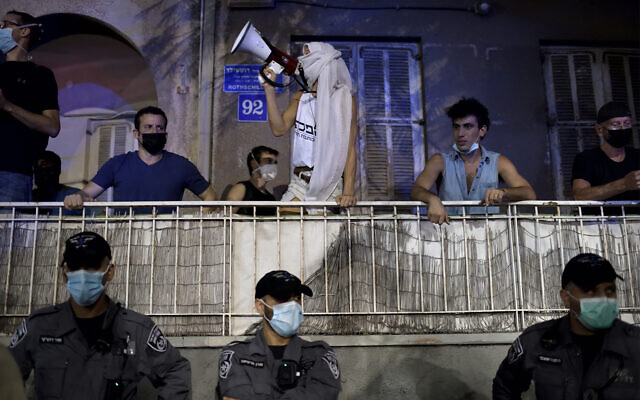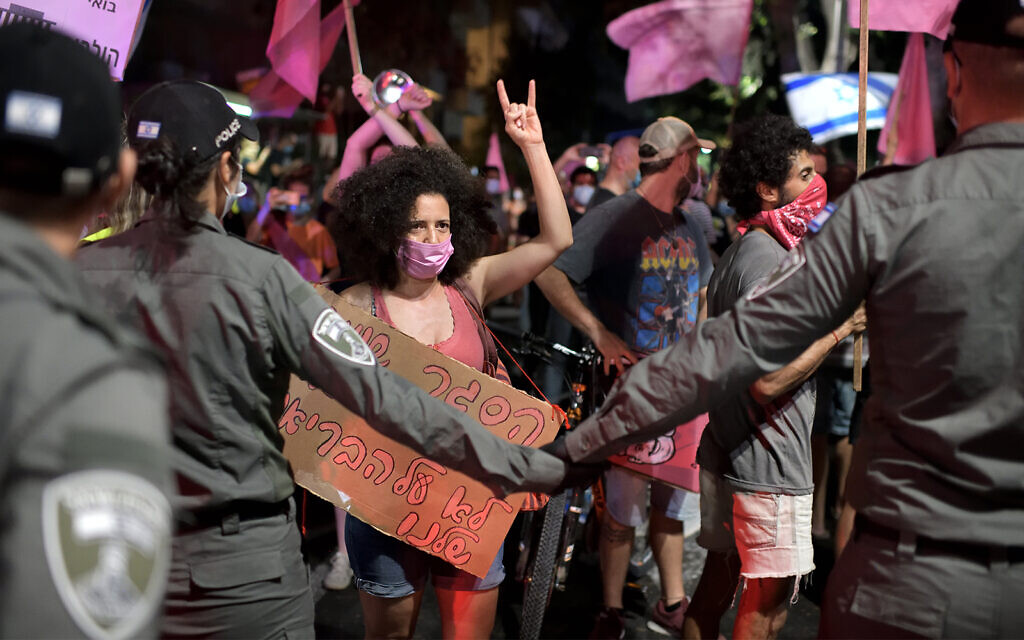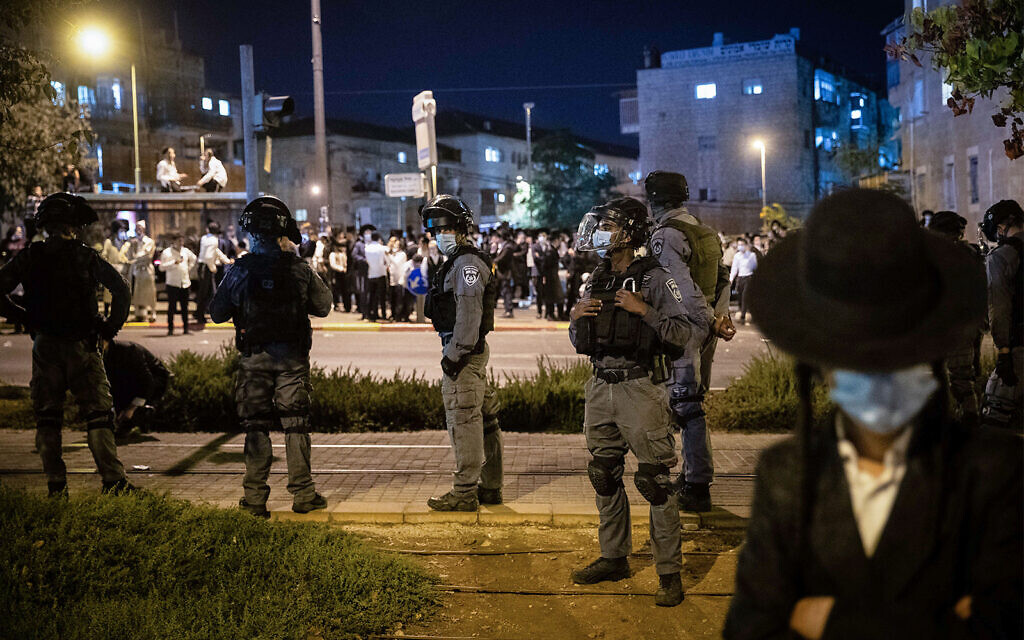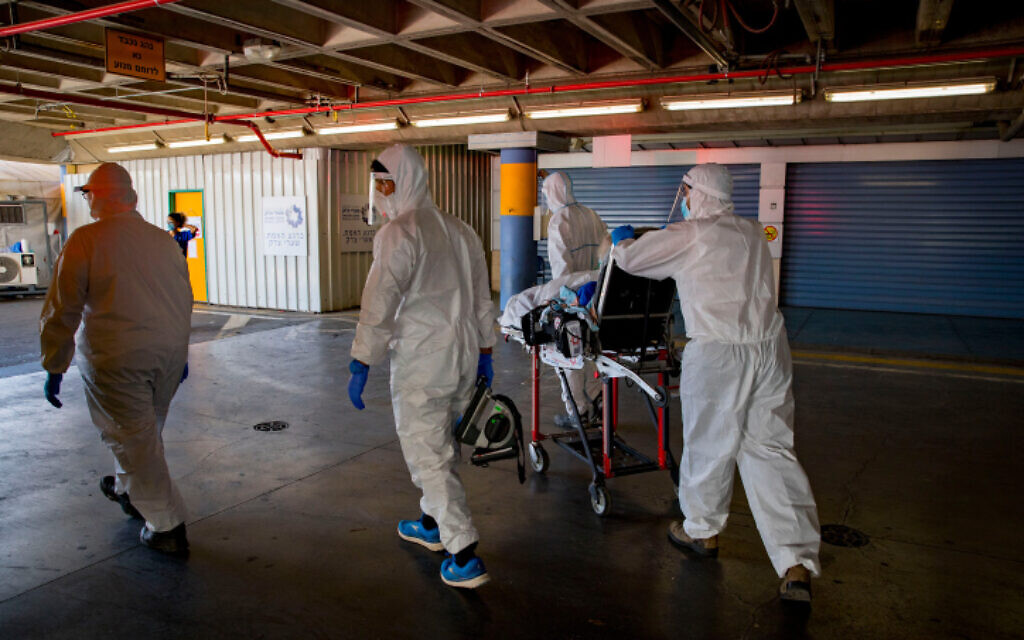Law limiting demonstrators to 1 kilometer from home extended to October 13; march held in Tel Aviv in violation of police orders; ultra-Orthodox scuffle with officers in Jerusalem

Government ministers late on Tuesday approved a one-week extension of a law that heavily restricts demonstrations and indoor prayers during the ongoing virus lockdown.
The law was approved by the Knesset Constitution, Law and Justice Committee last week and went into effect at midnight Thursday.
It was initially set to remain in force until Wednesday, and will now be in place until at least October 13. Officials previously said they were likely to extend the restrictions for at least another week.
Ministers approved the extension, which was put forward by Health Minister Yuli Edelstein, during a referendum held by telephone on Tuesday night.
The resolution put before the ministers for approval said that the number of Israelis sick with COVID-19 quadrupled since the start of September, Channel 12 reported.
It also said the number of contact tracers in Israel now stood at 1,300, with each able to carry out an average of two investigations per day, putting the government’s investigatory capacity far below the number of new daily infections.
The Health Ministry said on Tuesday that there were 5,680 new confirmed infections the previous day.
The lockdown rules, under a government-declared “special coronavirus emergency,” bar Israelis from traveling more than a kilometer from their homes to protest and limit demonstrations to socially distanced groups of 20, although they apparently also allow for multiple groups of 20 in “capsules” in areas with sufficient space for social-distancing between the capsules.
The law also limits indoor prayers at synagogues and visiting others’ sukkahs over the week-long Sukkot holiday, which began on Friday night.
Backers of the law argue that the protests are a major health hazard and cracking down on them is necessary given Israel’s skyrocketing infection rate.
The measure has faced vociferous opposition from critics, who say it undermines Israel’s democratic character and serves Prime Minister Benjamin Netanyahu’s political interests, using the virus as a cover.
The approval of the restrictions was seen as a blow to the weekly demonstrations outside Netanyahu’s official residence in Jerusalem. However, mass turnout during protests on Saturday throughout the country indicated it may have only served to further galvanize opposition to Netanyahu.
The extension announcement came shortly before midnight Tuesday as protests in Tel Aviv against Netanyahu came to an end.

Hundreds of protesters marched through Tel Aviv, against police regulations, after leaving the main protest area in Habima Square to head down Rothschild Boulevard.
Police announced to protesters that the gathering was illegal and called for them to disperse, but the marchers passed a police checkpoint without any major incidents, although there were some small scuffles between demonstrators and police. Officers issued dozens of tickets to the demonstrators for violating the lockdown rules, the Ynet news site reported.
In a change from typical police announcements, one officer told protesters through a megaphone: “We’re not against you, but you are all putting your health in danger.”
One protester was arrested after opening the door to a police cruiser and pouring a bottle of water inside the vehicle, Haaretz reported.
Protesters have repeatedly accused the police of taking heavy-handed action to rein in the demonstrations. Footage has shown officers using force against both anti-government and ultra-Orthodox protesters in recent weeks.
Also Tuesday night, ultra-Orthodox residents of Modiin Illit clashed with police who were trying to enforce virus restrictions. Hundreds of demonstrators surrounded a police vehicle in the city and threw stones and other objects toward police, Ynet reported.
Additional officers were called to the scene, three police were lightly injured, and four protesters were arrested.
Other protests took place in the ultra-Orthodox Jerusalem neighborhood of Mea Shearim for the third night in a row, with demonstrators throwing stones and other objects toward police who were trying to enforce restrictions. At least three protesters were arrested.

Criticism of the ultra-Orthodox community has been growing in recent days, with reports showing that a significant number are disregarding lockdown restrictions during the Sukkot holiday, including by continuing to host mass gatherings.
The ultra-Orthodox have seen sky-high coronavirus infection rates with an assessment last week finding that the rate of infection in the community is 2.5 times that of the national average.
As police have stepped up enforcement of regulations, there has been increasing anger in the ultra-Orthodox community and accusations of disproportionate force, including against children.
In other anti-government protests held in hundreds of locations around the country on Tuesday, thousands demonstrated in small groups and within a 1 kilometer range of their homes, in accordance with the lockdown rules.
Most demonstrators gathered on bridges and at intersections near their homes.
In response to the new restrictions, localized rallies have mushroomed along with mobile phone apps giving users locations of demonstrations near their homes.
The demonstrators are demanding that Netanyahu resign over the corruption charges against him, as well as the government response to the coronavirus pandemic and ensuing economic fallout.
In a positive development, data indicated on Tuesday that the curve of infection had begun to flatten, following several days of dropping “positivity rate” — the percentage of virus tests that return positive.

Preliminary Health Ministry figures showed Tuesday evening that the rate of coronavirus tests coming back positive was down to 10.2 percent, the lowest number seen since mid-September.
It’s unclear if the rate would stay as low, as it typically rises once final numbers for a day are available. Monday saw a positivity rate of 11.4%, still lower than previous highs of some 15%.
But despite the promising signs of the overall population’s infection rate beginning to drop, Channel 12 news reported Tuesday evening that the positive test rate in the ultra-Orthodox community remained at 23%. Meanwhile, the channel said there were some areas in the country with positive rates of only 8%.
Israel’s coronavirus czar, Prof. Ronni Gamzu, said in a Tuesday afternoon press conference that it was too early to tell if the new figures represented a significant trend.
Netanyahu said Tuesday there was reason for “cautious optimism” that Israel was on the way out of its raging second virus wave, but said that despite the positive signs, he would not be rushing to lift the nationwide lockdown, which has been in place, with varied levels of restrictions, since September 18.
The Health Ministry said it had found 3,566 new cases Tuesday by the evening, on just under 37,000 tests.
The number of patients in serious condition stood at 880. At the same time, 27 new deaths were recorded Tuesday, bringing the toll to 1,797.
As of Tuesday evening, the number of active cases stood at 63,831, the lowest figure recorded since September 25, though that could be a product of lowered testing over the past several days.
The number of daily new cases reached an all-time high last week of 9,053 on Wednesday, went down to 7,031 on Friday, then 2,581 on Saturday — when the numbers are always lower due to reduced testing over the weekend — and then 2,905 on Sunday, according to Health Ministry figures.
As reported by The Times of Israel
